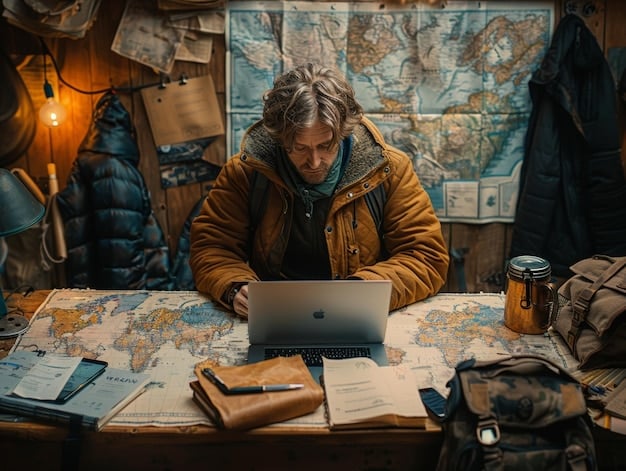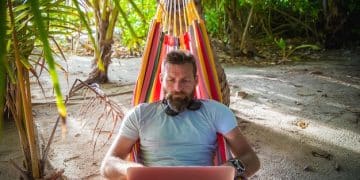Avoiding Burnout: Mental Health Tips for US Digital Nomads in 2025

Anúncios
Avoiding burnout is crucial for US digital nomads in 2025; this article provides actionable mental health tips, from establishing routines and setting boundaries to practicing mindfulness and seeking support, ensuring a sustainable and fulfilling nomadic lifestyle.
The allure of the digital nomad lifestyle, with its freedom and flexibility, is undeniable. However, the constant travel, inconsistent routines, and pressure to stay connected can lead to avoiding burnout: mental health tips for US digital nomads in 2025. This article provides practical strategies to safeguard your mental well-being while embracing the nomadic life.
Anúncios
Understanding Burnout in Digital Nomads
Burnout, a state of emotional, physical, and mental exhaustion caused by prolonged or excessive stress, is a significant concern for digital nomads. The unique challenges of this lifestyle can exacerbate the risk, making it essential to recognize the signs and understand the contributing factors.
Common Causes of Burnout
Several factors contribute to burnout among digital nomads. These include constant travel, which disrupts routines and sleep patterns, and the pressure to be constantly connected for work, leading to blurred boundaries between professional and personal life.
Anúncios
Recognizing the Symptoms
Identifying burnout early is crucial for effective intervention. Symptoms can manifest in various ways, including chronic fatigue, cynicism, feelings of detachment, and decreased performance. Recognizing these symptoms allows for timely intervention and prevention of further escalation.

Here are some of the most common symptoms:
- Persistent fatigue: Feeling tired even after adequate rest.
- Increased cynicism: A negative or detached attitude toward work and life.
- Reduced performance: Difficulty concentrating and completing tasks.
- Physical symptoms: Headaches, stomach problems, and other stress-related ailments.
Understanding the causes and symptoms of burnout is the first step in proactively addressing it. By recognizing these warning signs, digital nomads can implement strategies to protect their mental health and well-being.
Establishing a Routine and Setting Boundaries
Creating a structured routine and setting clear boundaries are fundamental strategies for preventing burnout. In the absence of a traditional office environment, digital nomads must proactively structure their lives to avoid overwork and promote mental well-being.
Creating a Daily Schedule
Establishing a daily schedule provides a sense of stability and control. This involves setting specific work hours, allocating time for meals, exercise, and relaxation, and adhering to the schedule as consistently as possible.
Setting Boundaries Between Work and Leisure
Digital nomads often struggle with blurring the lines between work and leisure. Setting clear boundaries involves designating specific workspaces, turning off work notifications during off-hours, and intentionally engaging in activities unrelated to work.
- Designate a workspace: Having a specific area for work helps to mentally separate it from leisure.
- Set work hours: Define clear start and end times for work each day.
- Turn off notifications: Minimize distractions by disabling work-related notifications during leisure time.
- Plan leisure activities: Intentionally schedule activities that promote relaxation and enjoyment.
By establishing a routine and enforcing boundaries, digital nomads can mitigate the risk of burnout, maintain a healthy work-life balance, and enhance their overall mental well-being.
Prioritizing Physical Health
Physical health is intrinsically linked to mental well-being. Regular exercise, a balanced diet, and sufficient sleep are essential for managing stress and preventing burnout. Prioritizing these aspects can significantly impact a digital nomad’s ability to cope with the demands of their lifestyle.

Regular Exercise
Engaging in regular physical activity is a powerful stress reliever. Whether it’s a brisk walk, a gym workout, or a yoga session, exercise releases endorphins that improve mood and reduce feelings of anxiety and depression.
Balanced Diet
A balanced diet provides the necessary nutrients to support both physical and mental health. Consuming a variety of fruits, vegetables, lean proteins, and whole grains can enhance energy levels, improve cognitive function, and boost overall well-being.
Small dietary changes can yield benefits:
- Incorporate fruits and vegetables: Aim for at least five servings a day.
- Stay hydrated: Drink plenty of water throughout the day.
- Limit processed foods: Reduce intake of sugary and fatty foods.
- Mindful eating: Pay attention to hunger and fullness cues to avoid overeating.
Prioritizing physical health through regular exercise and a balanced diet is a proactive strategy for managing stress, improving mental resilience, and preventing burnout among digital nomads.
Mindfulness and Meditation Techniques
Mindfulness and meditation techniques have gained widespread recognition for their ability to reduce stress, improve focus, and enhance overall mental well-being. For digital nomads, who often face high levels of stress and uncertainty, these practices can be particularly beneficial.
Practicing Mindfulness
Mindfulness involves paying attention to the present moment without judgment. This can be achieved through various exercises, such as focusing on the breath, observing thoughts and feelings, and engaging fully in daily activities.
Meditation Techniques
Meditation involves training the mind to focus and calm itself. There are various meditation techniques, including guided meditation, transcendental meditation, and mindfulness meditation. Each technique offers unique benefits for reducing stress and promoting relaxation.
Effective meditation practices include:
- Deep breathing exercises: Simple techniques to calm the nervous system.
- Guided meditation: Using audio guides to visualize relaxation.
- Body scan meditation: Focusing on different parts of the body to release tension.
Integrating mindfulness and meditation into daily life can significantly reduce stress, enhance mental clarity, and improve overall well-being, making these practices invaluable tools for digital nomads.
Building a Supportive Community
Social isolation can be a significant challenge for digital nomads. Building and maintaining a supportive community is essential for emotional support, reducing feelings of loneliness, and promoting mental well-being. Connecting with others who understand the unique challenges of the lifestyle can make a substantial difference.
Finding Your Tribe
Finding a supportive community involves connecting with like-minded individuals who share similar interests and values. This can be achieved through online forums, social media groups, and in-person meetups. Actively participating in these communities can foster meaningful connections and provide a sense of belonging.
Staying Connected with Family and Friends
Maintaining connections with family and friends back home is equally important. Regular communication, whether through phone calls, video chats, or social media, can provide a sense of continuity and support, even from a distance.
Strategies to stay connected include:
- Schedule regular calls: Set aside specific times to connect with loved ones.
- Join online communities: Engage in discussions and share experiences.
- Attend local meetups: Connect with other digital nomads in person.
Building a strong support network can mitigate the negative effects of isolation, enhance emotional resilience, and promote overall mental well-being, making it an indispensable aspect of the digital nomad lifestyle.
Seeking Professional Help When Needed
Recognizing when to seek professional help is crucial for maintaining mental health. Despite implementing preventive measures, some individuals may still experience symptoms of burnout or other mental health issues. In such cases, seeking support from a qualified mental health professional is essential.
Identifying When to Seek Help
It’s important to recognize when feelings of stress, anxiety, or depression become overwhelming. Persistent symptoms that interfere with daily functioning, such as difficulty sleeping, loss of appetite, or chronic fatigue, may indicate the need for professional intervention.
Accessing Mental Health Resources
Digital nomads have access to a variety of mental health resources, including online therapy platforms, telehealth services, and international mental health organizations. These resources provide convenient and accessible support, regardless of location.
Mental health resources include:
- Online therapy platforms: Services like Talkspace and BetterHelp offer virtual therapy sessions.
- Telehealth services: Access to mental health professionals via phone or video.
- International mental health organizations: Organizations that provide support and resources for expatriates and travelers.
Being proactive about seeking professional help when needed demonstrates a commitment to mental health and well-being, ensuring that digital nomads can navigate the challenges of their lifestyle with resilience and support.
Planning for Financial Stability
Financial instability can be a significant source of stress for digital nomads. Planning and managing finances effectively can reduce anxiety and promote a sense of security, contributing to overall mental well-being.
Budgeting and Saving
Creating a budget and tracking expenses helps to ensure that income exceeds expenses. Setting financial goals, such as saving for emergencies or retirement, can also provide a sense of purpose and motivation.
Diversifying Income Streams
Relying on a single source of income can be risky. Diversifying income streams, such as through freelance work, online courses, or investments, can provide a more stable and secure financial foundation.
Tips for financial planning include:
- Create a budget: Track income and expenses to identify areas for savings.
- Set financial goals: Establish clear objectives for saving and investing.
- Diversify income: Explore multiple sources of revenue.
- Automate savings: Set up automatic transfers to savings accounts.
Effective financial planning can alleviate stress and promote a sense of security, enabling digital nomads to pursue their lifestyle with greater confidence and peace of mind.
| Key Point | Brief Description |
|---|---|
| 📅 Routine & Boundaries | Establish daily schedules and clear work-life boundaries. |
| 💪 Physical Health | Prioritize exercise, balanced diet, and sufficient sleep. |
| 🧘 Mindfulness | Practice mindfulness and meditation to reduce stress. |
| 🤝 Community | Build a supportive network for emotional well-being. |
FAQ
▼
Common signs include chronic fatigue, increased cynicism, reduced performance, and physical symptoms like headaches. Recognizing these early can help prevent escalation and promote timely intervention.
▼
Designate a specific workspace, set clear work hours, turn off work notifications during leisure time, and intentionally plan leisure activities to ensure a healthy balance.
▼
Regular exercise and a balanced diet improve mood, reduce anxiety, and boost overall well-being, making it easier to cope with the demands of the nomadic lifestyle.
▼
Mindfulness and meditation reduce stress, improve focus, and enhance mental clarity, providing invaluable tools for digital nomads facing high levels of stress and uncertainty daily.
▼
Digital nomads can access online therapy platforms like Talkspace and BetterHelp, telehealth services, and international mental health organizations for convenient and accessible support, regardless of their location worldwide.
Conclusion
In conclusion, avoiding burnout requires proactive strategies tailored to the unique challenges of the digital nomad lifestyle. By establishing routines, prioritizing physical health, practicing mindfulness, building supportive communities, and seeking professional help when needed, US digital nomads in 2025 can sustain their well-being and thrive in their nomadic journey.





